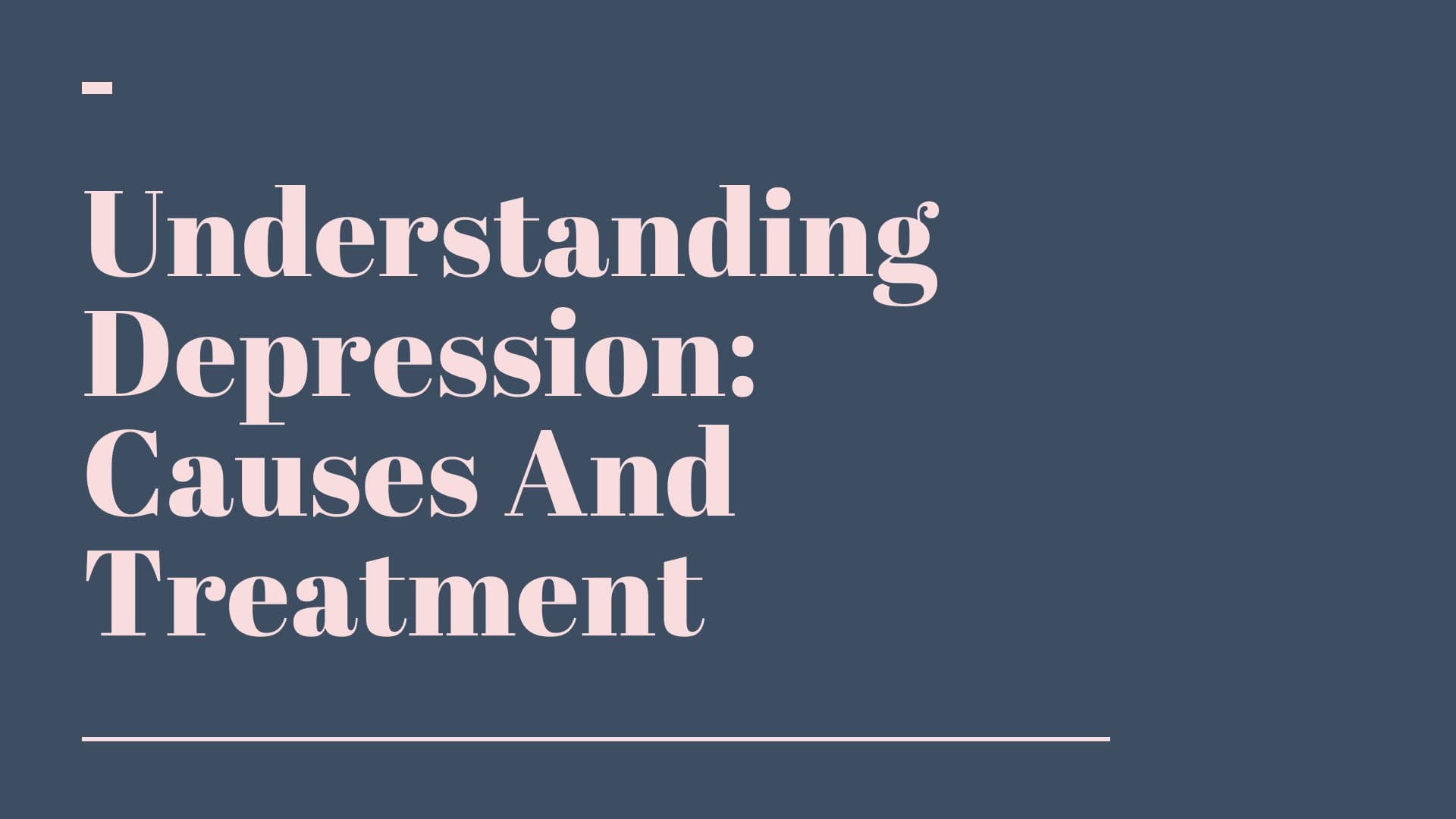Understanding Depression: Causes And Treatment

What is depression?
Depression is a mental health disorder characterized by persistent feelings of sadness, hopelessness, and loss of interest in daily activities. It can also cause physical symptoms such as fatigue, changes in appetite and sleep patterns, and difficulty concentrating. Depression can affect anyone and can range from mild to severe. It is a treatable condition, but it often goes undiagnosed and untreated, leading to a significant impact on an individual’s quality of life and overall well-being.
Overview:
Depression is a complex mental disorder that affects a person’s thoughts, feelings, behavior, and physical well-being. It is more than just feeling sad or down for a few days. People with depression experience a persistent low mood, feelings of hopelessness, and a lack of energy or motivation. They may also experience changes in sleep patterns, appetite, and weight, as well as difficulty concentrating, making decisions, and feeling pleasure.
Types of Depressions
- Major Depressive Disorder (MDD): A serious mental health condition characterized by persistent feelings of sadness, hopelessness, and a loss of interest in activities that were once enjoyable. It can also cause physical symptoms such as changes in appetite and sleep patterns.
- Persistent Depressive Disorder (PDD): A chronic form of depression that lasts for at least two years. It is characterized by a low mood, feelings of hopelessness, and a lack of interest in life.
- Bipolar Disorder: A mood disorder characterized by episodes of extreme highs (mania) and lows (depression). During manic episodes, individuals may feel extremely energized and productive, while during depressive episodes, they may feel hopeless and unable to function.
- Postpartum Depression: A form of depression that affects women after giving birth. It is characterized by feelings of sadness, anxiety, and hopelessness, and may also cause physical symptoms such as changes in appetite and sleep patterns.
- Seasonal Affective Disorder (SAD): A type of depression that occurs during the fall and winter months when there is less natural sunlight. It is characterized by feelings of sadness, hopelessness, and a lack of energy.
- Atypical Depression: A form of depression characterized by symptoms that do not fit the typical criteria for major depressive disorder. It is characterized by a lack of energy, changes in appetite, and a sensitivity to rejection.
Symptoms
Symptoms of depression can vary from person to person, but some common symptoms include:
- Persistent feelings of sadness, hopelessness, and emptiness
- Loss of interest in activities that were once enjoyed
- Difficulty sleeping or oversleeping
- Fatigue and low energy levels
- Changes in appetite and weight
- Difficulty concentrating and making decisions
- Feelings of worthlessness or guilt
- Thoughts of suicide or self-harm
- Physical symptoms such as headaches or stomachaches
- Difficulty maintaining relationships and social connections.
Causes & Risk factor
- Genetics: Depression can run in families and may be caused by a combination of genetic and environmental factors.
- Brain chemistry: Imbalances in certain chemicals in the brain, such as serotonin and dopamine, can contribute to the development of depression.
- Trauma and stress: Traumatic events such as abuse, the loss of a loved one, or major life changes can trigger depression.
- Medical conditions: Certain medical conditions such as heart disease, thyroid problems, and chronic pain can increase the risk of depression.
- Medications: Certain medications, such as antidepressants, can cause side effects that lead to depression.
- Substance abuse: Alcohol and drug abuse can lead to depression and make it harder to treat.
- Social factors: Social isolation, lack of support, and financial stress can contribute to depression.
- Hormonal imbalances: Changes in hormones, such as during pregnancy or menopause, can lead to depression.
- Lack of sleep: Chronic insomnia or poor sleep can contribute to depression.
- Nutritional deficiencies: A lack of certain vitamins and minerals can also contribute to depression.
Some of the most common risk factors for depression include:
- A family history of depression
- Chronic medical conditions
- Substance abuse
- Trauma or abuse
- Certain medications
- Social isolation
Treatment of Depression
- Medication: Antidepressant medication, such as selective serotonin reuptake inhibitors (SSRIs), can help to regulate the levels of certain chemicals in the brain that are associated with mood and emotion.
- Therapy: Cognitive Behavioral Therapy (CBT) and talk therapy can help individuals identify and change negative thought patterns that contribute to depression.
- Electroconvulsive therapy (ECT): This treatment uses a mild electric current to induce a seizure, which can help to alleviate symptoms of depression.
- Light therapy: This treatment involves exposure to bright light, which can help to regulate the body’s circadian rhythm and improve mood.
- Mindfulness and relaxation techniques: Techniques such as yoga, meditation, and deep breathing can help to reduce stress and improve overall well-being.
- Lifestyle changes: Making changes to your diet, exercise routine, and social connections can also help to improve symptoms of depression.
- Support groups: Joining a support group can provide a sense of community and a safe space to share experiences and coping strategies with others.
- Hospitalization: In severe cases, hospitalization may be necessary to provide close monitoring, medication management, and therapy.
In conclusion, depression is a common mental health condition that affects millions of people worldwide. It’s characterized by a persistent feeling of sadness, hopelessness, and a lack of interest in activities that were once enjoyed. It can cause a wide range of physical and emotional symptoms. The exact cause of depression is not known, but it is believed to be a combination of genetic, biological, environmental, and psychological factors. Treatment options include medication, therapy, and lifestyle changes. It’s important to seek professional help if you or someone you know is suffering from depression.
At CareMe Health, we understand that every individual’s experience with depression is unique. That’s why we provide customized treatment plans, tailored to each patient’s specific needs and goals. Our team of experts uses a combination of evidence-based therapies and medications to deliver proven results in the treatment of depression.
Related Articles

Letting Go With Grace: Emotional Tools for Closure
Letting go is never easy. Whether we are parting ways with a loved one, ending a relationship, leaving a job, or saying goodbye to a cherished chapter of life, the emotional weight can feel overwhelming. Yet, closure is essential for our emotional well-being. Without it, we carry unresolved grief, anger, regret, or longing that can seep into new relationships and experiences, holding us back from healing and growth.

Breakup Blues: How to Cope and Rebuild Your Self-Worth
A breakup often feels like a silent earthquake—unseen by others but devastating within. The pain doesn’t just come from the loss of a relationship, but from the crumbling of the life, identity, and future you built with another person. You may find yourself questioning your worth, doubting your value, and feeling isolated even when surrounded by people. In Indian society, where emotional expression is often discouraged and breakups can be stigmatized, this pain may feel even more overwhelming. But the truth is—while breakups may shake you, they do not define you. You are not broken; you are in a process of emotional reformation. And with the right tools, guidance, and support system, you can rebuild not just your self-worth but also your entire life narrative.

Healing After Heartbreak: A Mental Health Perspective
Heartbreak doesn't just break your heart—it can shatter your sense of identity, peace, and purpose. Whether the end was expected or abrupt, mutual or one-sided, short-lived or long-term, the aftermath often leaves people emotionally disoriented. In Indian culture, where societal expectations and family involvement in romantic relationships are prevalent, the pain is not just personal—it is public. Yet, very few are taught how to heal from emotional loss in a healthy, sustainable way.

Boundaries in Love: Saying ‘No’ Without Guilt
Love, in its truest form, should be a safe space—a space where individuality is not only respected but celebrated. Yet, in many relationships, especially in the Indian cultural context, love is often misunderstood as constant availability, complete sacrifice, and putting the other person first, always. As noble as this may sound, this version of love often leads to emotional exhaustion, suppressed resentment, and the erosion of one’s identity.

Gaslighting in Relationships: What It Is and How to Heal
Gaslighting is a form of emotional abuse that erodes your ability to trust your own perception. It’s a slow, insidious process that often begins with subtle doubts and ends with complete self-questioning. In romantic relationships—especially in the Indian context where silence, compromise, and duty are often mistaken for love—gaslighting can be even harder to recognize.

How Depression Can Affect Your Relationship—And What You Can Do
Depression is not just an internal struggle—it ripples outward, affecting relationships, routines, and the emotional fabric that holds people together. When someone is dealing with depression, it's not only their world that becomes dim—it can cast a shadow over their most intimate connections too. In a country like India, where open conversations about mental health are still rare and love is often equated with endurance, depression within a relationship can become invisible, misunderstood, or misjudged.
